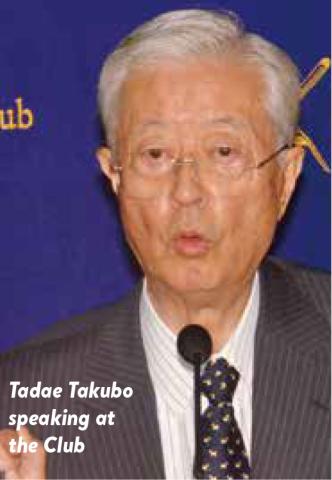Issue:
The head of a controversial political action group explains their agenda for the future.
Seeking to create a “normal” nation
by JULIAN RYALL by MONZURUL HUQ
THE VICTORY OF SHINZO Abe’s Liberal Democratic Party in the July 10 election for the Upper House of the Diet will serve as the springboard for revisions to the Constitution within the next 10 years, believes Tadae Takubo, chairman of Nippon Kaigi, or the Japan Conference. And that, he told a well attended press conference at the FCCJ on July 13, will turn Japan into “a normal nation.”
“The fact that those who are in favor of constitutional amendments have two thirds majorities in both houses means this is the best chance to go ahead with revisions to the Constitution,” he said. “And if I were in Prime Minister Abe’s position, I would be making every effort during my term to achieve that.”
Takubo, a former head of the foreign news department of Jiji Press and a member of the FCCJ since 1975, has committed Nippon Kaigi to helping the prime minister to do precisely that. “We have many voices within our conference which have very much welcomed this result and we have released a statement to that effect,” he said. “So Nippon Kaigi will from now on be considering various different actions that we can take to move forward.”
Set up in May 1997 as a merger of two similarly minded organizations, Nippon Kaigi has around 38,000 members, including an estimated 39 percent of politicians in the Diet. Abe is listed as a special advisor to the group’s parliamentary league.
In its mission statement, Nippon Kaigi says it intends to “change the postwar national consciousness based on the Tokyo Tribunal’s view of history as a fundamental problem,” as well as promoting “patriotic” education and support for the prime minister paying official visits to Yasukuni Shrine.
A report compiled by the US Congressional Research Service in 2014 stated that the organization believes “Japan should be applauded for liberating much of East Asia from Western colonial powers” during the early decades of the last century and that “killings by Imperial Japanese troops during he 1937 Nanking massacre were exaggerated or fabricated.”
Equally, “comfort women” were not forced to provide sexual services for the military during the war, while Japan was a victim of the conflict due to the atomic bomb attacks on Hiroshima and Nagasaki.
Tamosu Sagano, who wrote a best selling book about the group’s activities, described Nippon Kaigi as reactionaries determined to turn back sexual equality and to restore patriarchal values. Their vision is of “a Japan where women, children and foreigners have no basic human rights,” he wrote.

“Abe has made efforts to bring Japan from the extreme left to the center”
QUESTIONED ABOUT NIPPON KAIGI’S position on the war, Takubo replied, “For all countries that have gone to war, each one will have a different view of history. If you want to call that revisionism, then I’m alright with that.”
And was Japan wrong to wage war in the early decades of the last century?
“I believe that some parts were wrong and some were correct,” he said. “I do not believe we can say that one party was completely right and one that was completely wrong.”
Revising a Constitution that many conservatives believe was imposed on a defeated Japan by the Allies after the end of the war still remains Nippon Kaigi’s priority. “I believe the position that Japan is in now was very accurately put forward 20 something years ago by Professor [Zbigniew] Brzezinski. He put forward in his thesis that Japan is a de facto protectorate of the United States,” he said. “And that the state is based on the three main pillars of the economy, politics and the military. In the case of Japan, however, one of these three pillars the military is missing and the situation is one of a completely abnormal country.”
Not being able to make its own decisions on diplomatic or defense issues for more than 70 years means that Japan has been on the extreme left of the political spectrum, Takubo claimed. “Abe is not someone who has started in the center, where a normal country is, and shifted towards the right,” he said. “He is the only politician who has made efforts to bring Japan from the extreme left to the center, as a normal country.”
Takubo believes changes are on the way. “In regard to the 10 year vision, I believe the Constitution will be revised in this time and we will progress towards being a normal country located in northeast Asia,” he said.
“Of course, we have to avoid causing a sense of threat with neighboring countries and we need to co exist within this region,” he added. “If we look at these next 10 years, I believe that Japan will create a military, but that it will remain under civilian control. This will be one way to prevent neighboring countries having concerns.”
Takubo also took issue with the characterization of Abe as a nationalist in foreign media reports. “I believe that the kind of reporting that is made from Japan to the outside world is very much dependent on what perspective or what standpoint the reporters are starting from,” he said.
“There is reporting which claims that Japan is in a very dangerous position at the moment, that it is very belligerent and that Abe has risen as a nationalist,” he said. “I do not, however, believe this is the case.”
Julian Ryall is Japan correspondent for the Daily Telegraph.

